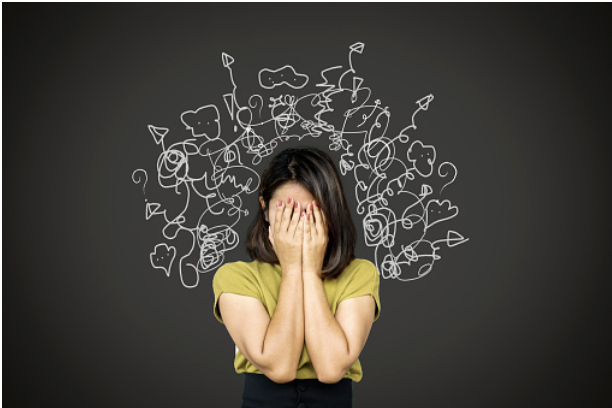ADHD: Tips and Tricks for How to Cope
Woman with black hair deep in thoughts, leaning against a blackboard, having trouble processing. Image by Doucefluer.
Millions of different thoughts bouncing frantically off the walls of your brain, darting back and forth in total chaos. Pent up energy seems to burst all at once and you lose all ability to focus on the task at hand. For students with ADHD, this manic scene is a daily routine.
Attention Deficit Hyperactivity Disorder, better known as ADHD, is an often overlooked learning deficiency that makes it difficult to focus and causes hyperactivity and impulsiveness. ADHD is usually diagnosed in early childhood and develops as a person gets older. After being diagnosed, you’ll likely be prescribed medication that suppresses your energy, personality, and appetite, making your day even harder by adding unneeded stress and exhaustion.
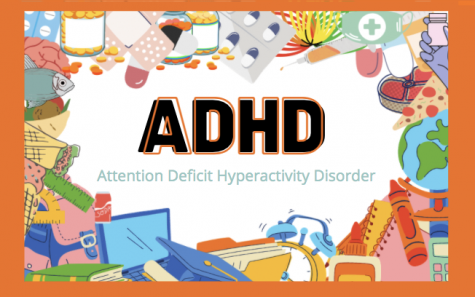
As a student and teenager with ADHD, I know how important it is to find a variety of strategies for improving energy release and focus. Unfortunately, most people aren’t aware of any methods other than medication, when there’s really everything from fidget toys and exercises to dietary supplements and ADHD coaching.
Here are a few helpful strategies that have been proven helpful for students and teens with ADHD, as well as the academic support Milken has to offer.
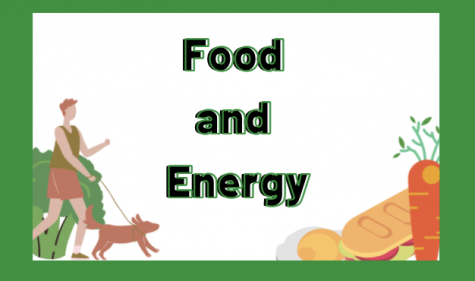
Food and dietary supplements
Recent studies done by the American Psychiatric Association have shown that certain food groups can lessen the symptoms of ADHD.
- High protein foods like beans, meat, nuts, eggs, and cheese can increase levels of concentration.
- ADHD often makes it harder to fall asleep, complex carbohydrates like sweet potatoes, kiwi, tangerines, pears, grapefruit, and apples can help.
- Omega 3 fatty acids such as tuna, whitefish, salmon, olive oil, and brazil nuts help to improve cell communication in the brain. Omega 3 vitamin supplements such as fish oil, are also available.
Exercise
Releasing energy is one of the most important things to do when you have ADHD.
- I have found that doing a consistent workout such as dance, cardio, and certain sports like soccer and basketball, can help ease pent-up energy and stress because they are high energy activities. Less hyperactivity induced stress makes it much easier to focus, and is generally good for your well being.
- Exercise can also improve your quality of sleep.
Fidgeting
When both on and off of medication, students can benefit from channeling their hyperactivity into fidgeting.
- Fidget toys like stress balls, fidget spinners, fidget cubes, snake puzzles, pop-its, rubiks cubes, and squishies can help you concentrate by keeping your mind stimulated.
- If you don’t like fidget toys, drawing or doodling is another option.
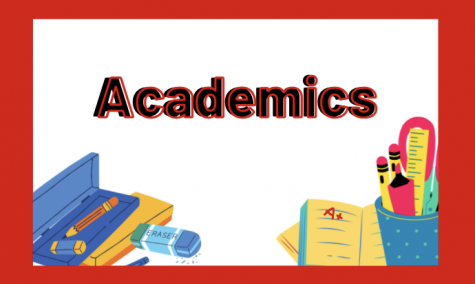
Academic Support
There are many academic support options both in and out of school that often make a big difference in a student’s organizational skills and help to improve grades and general learning.
- Milken provides academic support and accommodations to students who have different learning difficulties. These accommodations include meetings with academic planners, extra time on practice and assessments, preferred seating, and more. Talk to your parents about possibly applying for these accommodations.
- Lishma is a helpful option available to every student after school Mondays, Tuesdays, and Thursdays where you can speak to your individual teachers and work together to figure out the best possible methods to improve your learning.
- If you don’t find the right academic support at Milken, there are many tutors available online or in person for every specific subject.
- ADHD coaches are also available to help with academics and everyday organization.
How to receive Academic Support and Accommodations at Milken.
The majority of students at Milken are aware that accommodations exist but are not necessarily aware of how to apply for them. According to 9/10 Division Learning Specialist, Travis Kiley, the solution to that is quite simple. For students to access accommodations, Mr. Kiley says, “It really just takes an email or grabbing myself or Mr. McKay [9/10 academic support] to set up either consistent check-ins or just kind of a one-off if you just need something in general.” Check-ins can happen weekly, monthly, or biweekly. “That’s really all it takes, we’re here to support all of our students at all times,” states Mr. Kiley. Students in the 11/12 division should contact either Hannah Aftalion(Division 11/12 Learning Specialist) or Sarah Farkas(Division 11/12 Academic Support), if applying for accommodations.
Travis Kiley, Division 9/10 Learning Specialist: [email protected]
Stephen McKay, Division 9/10 Academic Support: [email protected]
Hannah Aftalion, Division 11/12 Learning Specialist: [email protected]
Sarah Farkas, Division 11/12 Academic Support: [email protected]
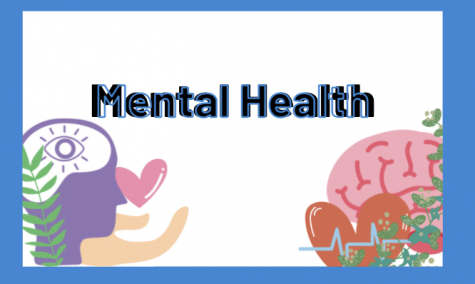
Mental Health
ADHD and certain medications can take a toll on your mental health. It’s beyond important to put taking care of your mental and physical health before anything else.
- Therapists are a great way of taking care of your mental health. It can be extremely helpful to have somebody to talk to who will listen to you. Cognitive therapists can specialize in helping patients with ADHD symptoms. Having worked with a therapist before, I can confirm that having someone to talk to can really take off some of the mental load.
- Meditation can help put your mind at ease during exhausting, stressful times. Online meditation apps like Headspace and Calm are available. This is a strategy highly recommended by therapists.
- Psychiatrists are also beneficial to your mental health when it comes to ADHD by helping you get used to your medication. Having worked with psychiatrists I know how beneficial it is to find the right medication and keep your dose on track.
- Sleep is one of the most effective ways of taking care of your health. You need time to rest, decompress, and relax. Lack of sleep can make ADHD and your general mentality worse.
- Group therapy is a helpful way to relate and get help from others who experience similar circumstances. Therapy groups vary whether it’s grief, addiction, cognitive, familial, or general therapy. It’s helpful to know you’ll always have people you can rely on.
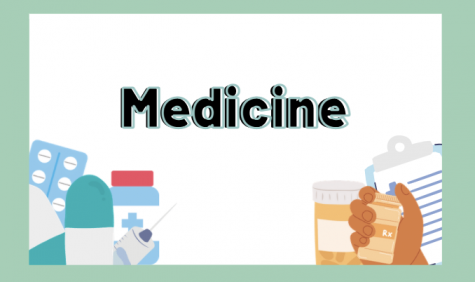
* Please note that all ADHD medication should be professionally prescribed by either a doctor or psychiatrist who has confirmed that the patient has ADHD and/or symptoms of ADHD. Side effects of ADHD may vary depending on brand, dosage, sex, age, personal circumstance, and medical history. If you are experiencing symptoms of ADHD, consult a psychiatrist or doctor before considering any medication.
Dealing with Medication
Loss of appetite, exhaustion, irritability, random tics, and problems sleeping are only a few of the negative side effects of the majority of ADHD medications. Though it helps you concentrate, the negative effects can be frustrating to deal with on a daily basis. Having been on ADHD medication since a young age, I understand the daily struggles that it brings. These are a few helpful strategies for easing those side effects.
- Loss of appetite- Appetite loss makes it difficult to eat a proper meal. Eating a nutritious breakfast before taking the medication and eating a large snack right after it wears off can be beneficial. It’s also helpful to take small snacks with you in case you get even slightly hungry throughout the day.
- Trouble sleeping- Putting devices away and reading an hour before you go to bed can help you fall asleep more easily, as your brain cells aren’t being as stimulated. Melatonin supplements are also available.
- Exhaustion- Drinking smoothies or juice throughout the day can help you feel a bit more active and keep blood sugar stable. Drinking coffee, tea, or any sort of caffeine should be taken in small amounts or just at the beginning of the day.
- Irritability- Calm surroundings can be essential to helping irritability while on medication. Let your friends, teachers, or family members know that you are feeling irritable and figure out how to create a stable and peaceful environment.
Everyone deals with ADHD in a different way. It’s essential to find what works for you. Small changes can improve your life and well being. Taking care of yourself, mentally and physically, is an incredibly important role in handling ADHD.
Tevelle Bitton is currently a Senior at Milken Community Schools and has loved writing since she can remember. This year will be her third year writing...



